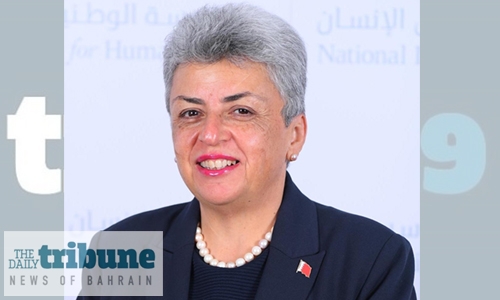Royal decree pardoning inmates a key rights milestone, says NIHR
Chairperson of the National Institution for Human Rights (NIHR), Maria Khoury, has praised the royal decree, issued by His Majesty King Hamad bin Isa Al Khalifa, pardoning 269 inmates and replacing the remaining jail sentences with non-custodial penalties for 530 inmates.
Khoury stressed that the royal directives are aimed at promoting human rights, strengthening family relations and enhancing social stability, adding that the royal gesture contributes to protecting human rights as they reform convicts for the sake of re-integrating them into society, humanise penalty and spread the spirit of love, tolerance, responsibility and community partnership among the members of the one-family Bahraini society.
The NIHR chief called on the beneficiaries of alternative punishment and their families to interact positively and cooperate with the relevant authorities to achieve the fundamental purpose of alternative punishment. She also called on various sectors, entities and NGOs to accept the beneficiaries of alternative punishment to effectively contribute to ensuring its success and expansion.
Khoury indicated that the alternative punishment is a creative idea that ensures striking a balance between achieving the purpose of the penalty and protecting the values of human rights, in addition to promoting the culture of rehabilitation, which, she said, is considered a positive step forward that adds to Bahrain’s human rights record.
Assistant Minister of Foreign Affairs, Abdulla Al Doseri had affirmed that the Kingdom was keen on enabling society in all its categories to enjoy their full economic, social and cultural rights through a legal and procedural system that achieves social justice, insurance against disease, poverty, and inability to work, and eliminating unemployment by creating decent work opportunities, which was emphasised by the National Action Charter and the Constitution, led by His Majesty King Hamad bin Isa Al Khalifa, to maintain human development in all its dimensions.
He pointed out that the Kingdom does not have extreme poverty, and basic services are provided free of charge to all, especially education, health and social services, and the Kingdom has been able to achieve the Millennium Development Goals before the deadline in the year 2015, and has also incorporated the goals of sustainable development 2030 into government action programmes.
He noted that this came on the occasion of the Kingdom of Bahrain submitting its first national report under international human rights law and the Kingdom’s joining the International Covenant on Economic, Social and Cultural Rights in the year 2007 according to Law No (10) of 2007, the United Nations Committee through, which the Kingdom reviews laws, policies and measures it has taken and progress made in order to ensure respect for and promotion of human rights at all levels.
The Assistant Foreign Minister exemplified that the Kingdom of Bahrain is one of the countries with very high human development, and in line with the major European countries, as it continues to rise on the scale of all development indicators, as for example, the average life expectancy at birth reaches about 76 years, and reaches per capita gross domestic product to $28,240, and this high level of human development has been reflected in the system of social protection for citizens, as 15,354 citizens have benefited from social security assistance, with a total value of 15,620,950 BD.
Related Posts

